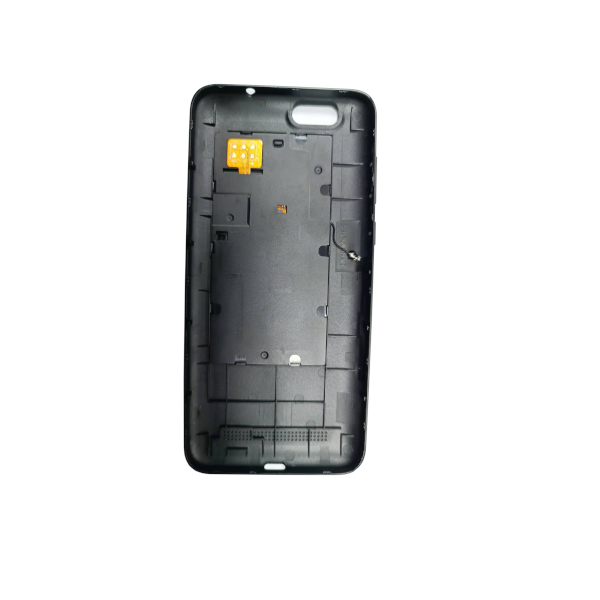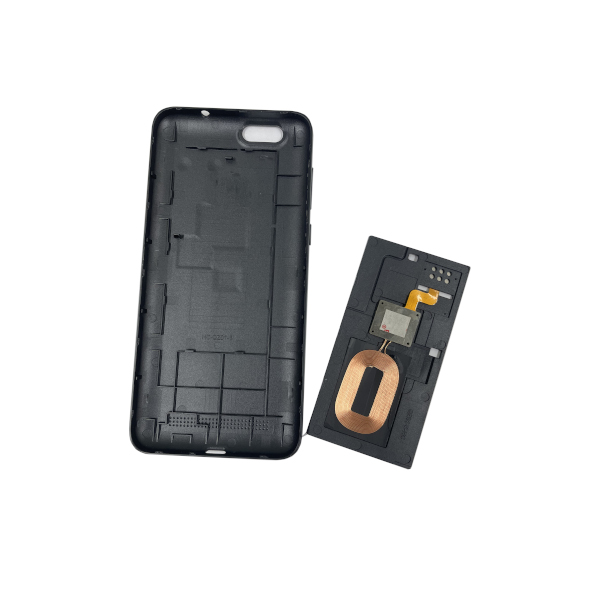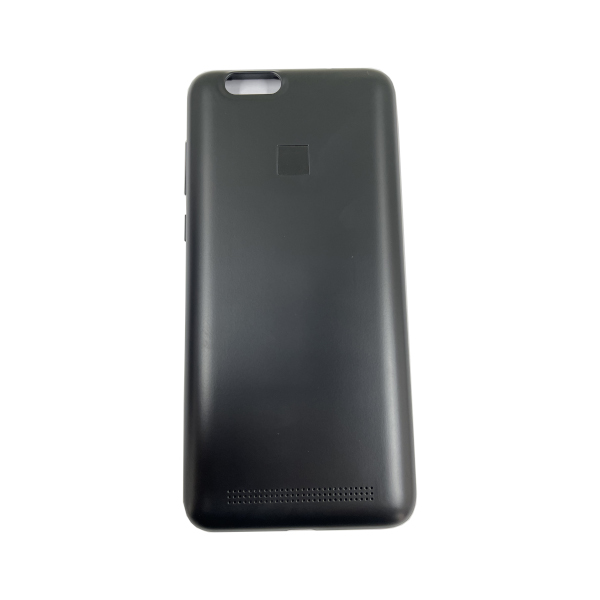Difference between revisions of "PinePhone (Pro) Add-ons"
(Created page with "{{hint|This page is incomplete, you're welcome to improve it.}} 400px|thumb|right|Rendering of the PinePhone (Pro) Keyboard =PinePhone (Pro...") |
(→Credit: fiox) |
||
| (40 intermediate revisions by 4 users not shown) | |||
| Line 1: | Line 1: | ||
== Keyboard == | |||
[[ | ''Main article: [[PinePhone (Pro) Keyboard]]'' | ||
The keyboard case works with both the PinePhone and PinePhone Pro and features a clam-shell design. It uses pogo pins located on the phone’s midsection and attaches by replacing the default back cover. When folded, the phone’s screen and the keyboard rest securely against each other. The hinge features a 180° design, which not only allows for two-hand typing on a surface but also for comfortable thumb-typing when fully extended. The etched keycaps can be easily relocated for alternate layouts such as AZERTY or QWERTZ. The keyboard case runs an [https://xff.cz/git/pinephone-keyboard/ open firmware], which means that anyone with the know-how can alter existing functions or add new ones. The bottom (keyboard) and top (phone) sections of the assembly are well-balanced thanks to the large, 6000mAh, internal battery capable of charging the PinePhone (Pro) during operation. The internal battery effectively triples the phone’s battery life. The internal keyboard battery can be manually toggled on/off and the keyboard’s battery charge level can be read in the supported operating systems; the keyboard remains functional with the battery fully depleted. | |||
You do not lose access to the PinePhone (Pro)’s USB-C port, speaker, microphone, or any external features, such as volume and lock buttons, with the keyboard attached. There is also a cut-out for the camera, torch, and headphone jack. The USB-C port on the keyboard is capable of powering both the keyboard and PinePhone (Pro) simultaneously. This means that you can plug in a USB mouse, a USB-C dongle, or some other peripheral while the phone and keyboard’s internal battery charge. Please keep in mind that the keyboard case transforms the PinePhone (Pro) into a PDA, which means that taking calls will likely prove awkward without a wired or wireless headset connected. | |||
Store page: [https://pine64.com/product/pinephone-pinephone-pro-keyboard-case/ pine64.com] | |||
== LoRa Add-on == | |||
Store page: [https://pine64.com/product/pinephone-pinephone-pro-pindio-lora-add-on-case/ pine64.com] | |||
[[File:PP LoRa.jpg|250px|Picture of the PinePhone (Pro) LoRa add-on]] | |||
Uses the pogo pins to interface a Semtech SX1262 LoRa module with the PinePhone (Pro). | |||
{{note|Software for receiving and sending LoRa messages with this back cover does exist, however no PinePhone operating system has added support for it yet.}} | |||
=== Schematics and Datasheet === | |||
Schematic: | |||
* [https://files.pine64.org/doc/PinePhone/Pinephone%20LoRa%20Back%20Cover%20Panel%20Schematic-v1.0-20210425.pdf PinePhone LoRa Back Cover Schematic ver 1.0 20210425] | |||
Datasheet: | |||
* [https://files.pine64.org/doc/datasheet/pinephone/DS_SX1261-2_V1.1-1307803.pdf SX1262 Long Range, Low Power, sub-GHz RF Transceiver Datasheet] | |||
* [https://files.pine64.org/doc/datasheet/pinephone/ATmel%20ATTiny%20Microcontroller%20Datasheet.pdf ATmel ATtiny Microcontroller Datasheet] | |||
I2C to SPI firmware: | |||
* [https://github.com/zschroeder6212/tiny-i2c-spi zschroeder6212's tiny-i2c-spi Github page] | |||
== Qi Wireless Charging Add-on == | |||
Store page: [https://pine64.com/product/pinephone-pinephone-pro-wireless-charging-add-on-case/ pine64.com] | |||
{{warning|Possible safety hazard: If the wireless charging chip fails for some reason, do not plug the phone in to charge via USB-C. Take the back case off first. It is possible that power gets fed into the chip, causing it to overheat, possibly causing damage to the phone and creating a fire-hazard. | |||
Album of damage caused by reverse current: [https://imgur.com/a/dJsp5wD] | |||
Until the cause of this is determined, it is recommended NOT to use the wireless charging add-on.}} | |||
[[File:PinePhone-Wireless-charger.jpg|250px|Picture of the PinePhone (Pro) wireless charging add-on]] | |||
Uses the pogo pins to supply Qi Wireless and Wireless Power Consortium compatible charging. No software required. | |||
=== Schematics and Datasheet === | |||
Schematic: | |||
* [https://files.pine64.org/doc/PinePhone/PinePhone%20Q-Wireless%20Charger%20Back%20Cover%20Schematic-20210508.pdf PinePhone Wireless Charger Back Cover Schematic ver 1.0 20210508] | |||
Datasheet: | |||
* [https://files.pine64.org/doc/datasheet/pinephone/HL6111RFNWP5_V1p0_20190121.pdf HL6111RFNWP5 5W WPC Wireless Power Receiver Datasheet] | |||
== Fingerprint Reader Add-on == | |||
Store page: [https://pine64.com/product/pinephone-pinephone-pro-fingerprint-reader-add-on-case/ pine64.com] | |||
[[File:PinePhone-FP-Addon.jpg|250px|Picture of the PinePhone (Pro) fingerprint reader add-on]] | |||
Uses the pogo pins to interface a high quality fingerprint sensor, which uses open firmware for it's i2c bridge, and can also be used for gesture navigation thanks to it's ability to detect directional swipes. | |||
{{note|No PinePhone operating system has added support for the fingerprint reader yet.}} | |||
=== Credits === | |||
Credit goes to the user ''zschroeder6212'', who carried the PinePhone Fingerprint Cover project from an idea to a real product. Their progress can be followed on GitHub under https://github.com/zschroeder6212. | |||
=== Schematics and Datasheet === | |||
Schematic: | |||
* [https://files.pine64.org/doc/PinePhone/Schematic_fingerprint%20driver%20board%20V3_2021-01-24.pdf PinePhone Finger Print Back Cover Schematic ver 3.0 20210124] | |||
Datasheet: | |||
* [https://files.pine64.org/doc/datasheet/pinephone/Datasheet_PixelAuth_PIA_Module_P2SDS-NABL2-S05_V7.0.0.5.pdf P2SD Personal Identity Authentication Module Datasheet] | |||
* [https://files.pine64.org/doc/datasheet/pinephone/ATmel%20ATTiny%20Microcontroller%20Datasheet.pdf ATmel ATtiny Microcontroller Datasheet] | |||
I2C to SPI firmware: | |||
* [https://github.com/zschroeder6212/tiny-i2c-spi zschroeder6212's tiny-i2c-spi Github page] | |||
[[Category:PinePhone]] | |||
[[Category:PinePhone Pro]] | |||
[[Category:PinePhone (Pro) Add-Ons]] | |||
Latest revision as of 00:36, 16 March 2023
Keyboard
Main article: PinePhone (Pro) Keyboard
The keyboard case works with both the PinePhone and PinePhone Pro and features a clam-shell design. It uses pogo pins located on the phone’s midsection and attaches by replacing the default back cover. When folded, the phone’s screen and the keyboard rest securely against each other. The hinge features a 180° design, which not only allows for two-hand typing on a surface but also for comfortable thumb-typing when fully extended. The etched keycaps can be easily relocated for alternate layouts such as AZERTY or QWERTZ. The keyboard case runs an open firmware, which means that anyone with the know-how can alter existing functions or add new ones. The bottom (keyboard) and top (phone) sections of the assembly are well-balanced thanks to the large, 6000mAh, internal battery capable of charging the PinePhone (Pro) during operation. The internal battery effectively triples the phone’s battery life. The internal keyboard battery can be manually toggled on/off and the keyboard’s battery charge level can be read in the supported operating systems; the keyboard remains functional with the battery fully depleted.
You do not lose access to the PinePhone (Pro)’s USB-C port, speaker, microphone, or any external features, such as volume and lock buttons, with the keyboard attached. There is also a cut-out for the camera, torch, and headphone jack. The USB-C port on the keyboard is capable of powering both the keyboard and PinePhone (Pro) simultaneously. This means that you can plug in a USB mouse, a USB-C dongle, or some other peripheral while the phone and keyboard’s internal battery charge. Please keep in mind that the keyboard case transforms the PinePhone (Pro) into a PDA, which means that taking calls will likely prove awkward without a wired or wireless headset connected.
Store page: pine64.com
LoRa Add-on
Store page: pine64.com
Uses the pogo pins to interface a Semtech SX1262 LoRa module with the PinePhone (Pro).
Schematics and Datasheet
Schematic:
Datasheet:
- SX1262 Long Range, Low Power, sub-GHz RF Transceiver Datasheet
- ATmel ATtiny Microcontroller Datasheet
I2C to SPI firmware:
Qi Wireless Charging Add-on
Store page: pine64.com
Album of damage caused by reverse current: [1]
Until the cause of this is determined, it is recommended NOT to use the wireless charging add-on.Uses the pogo pins to supply Qi Wireless and Wireless Power Consortium compatible charging. No software required.
Schematics and Datasheet
Schematic:
Datasheet:
Fingerprint Reader Add-on
Store page: pine64.com
Uses the pogo pins to interface a high quality fingerprint sensor, which uses open firmware for it's i2c bridge, and can also be used for gesture navigation thanks to it's ability to detect directional swipes.
Credits
Credit goes to the user zschroeder6212, who carried the PinePhone Fingerprint Cover project from an idea to a real product. Their progress can be followed on GitHub under https://github.com/zschroeder6212.
Schematics and Datasheet
Schematic:
Datasheet:
I2C to SPI firmware:


